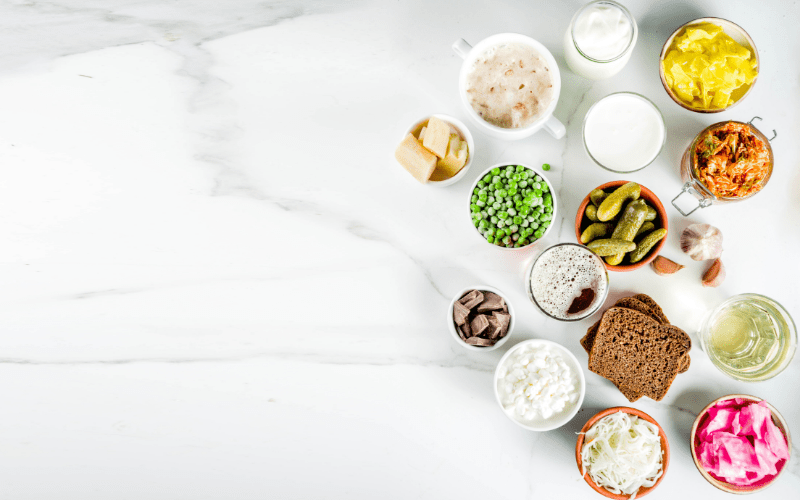Ways To Obliterate Brain Fog

Brain fog is a term that describes the inability to focus. It might occur after a restless night of sleep or a meal high in inflammatory foods, such as gluten, dairy, processed grains, or sugar. Although not a medical condition itself, brain fog usually occurs as a result of inflammation in the body. It can make you feel and increase the difficulty of simple tasks, such as memory, decision-making, and organizational skills. Here’s how to get rid of it. #1 – Get more sleep. Getting more sleep is easier said than done for most people. However, it’s often one of the primary reasons why you’re experiencing brain fog. Research shows that your brain doesn’t operate properly when you’re sleep-deprived. According to one study, sleep deficiency impairs working memory and attention as well as other functions, such as decision-making and long-term memory. Partial sleep deprivation also affects your cognitive function. It has been shown to influence attention, including vigilance. Additionally, lack of sleep impairs your brain cell’s ability to communicate with one another. Research from Harvard Medical School suggests that sleeping more can help burn away brain fog. Here’s how to get better sleep: Don’t try to multitask in your bedroom. In other words, don’t bring your laptop in and try to work before bed. Reserve your bedroom for sleep only. Try to make the room as dark as possible and reduce the amount of light you’re exposed to before getting in bed. If you don’t fall asleep with 20 minutes, some experts recommend getting up and doing something relaxing before trying again. Reduce stimulants throughout the day, including caffeine, nicotine, and alcohol. Eat a light meal for dinner so that your sleep isn’t disrupted by trying to digest a heavy meal. Exercise early in the day as opposed to at night. #2 – Cut out inflammatory foods. If you get brain fog after a meal, such as lunch, then try to think about what you ate that may have caused this. Many people get brain fog after eating gluten, which can be highly inflammatory. Other foods that may induce inflammation and brain fog include dairy, grains, sugar, soy, artificial sweeteners, sweeteners, food dyes, legumes, soda, candy, and vegetable oils. Eating an anti-inflammatory diet that is high in whole, unprocessed plant foods, healthy oils, and lean proteins can help obliterate brain fog. Focus on fruits, vegetables, nuts, olive oil, coconut oil, seeds, chicken, fish, eggs, and turkey. Some people may also tolerate sprouted grains well. #3 – Reduce stress. Stress can make it hard to think properly, especially if it’s ongoing. If you feel stressed due to overwhelming responsibilities, then getting organized can help you feel in control again. Writing out your daily tasks and setting a schedule can help. Don’t forget to schedule daily exercise as this is a great form of stress-relief. Exercise is also anti-inflammatory in nature and has been shown to boost mood, which can also help reduce stress and brain fog. Many people find that a good exercise session helps clear the mind.
Best Foods & Drinks To End Your Day With

In a perfect world, the end of your day would be ideal for relaxing and unwinding with loved ones. Unfortunately, the end of the day is usually just as hectic as mornings for most people and the choices we make can greatly affect our anxiety, sleep and wellbeing. Whether you’re struggling to get dinner on the table, running kids around to extracurricular activities, or taking your work home with you, it can be hard to relax and prepare for bed. We’ve put together a list of the best foods and drinks to end your day with so that you can reduce anxiety, sleep through the night, and even enjoy a little me time. End your day with… Fish If you have trouble sleeping at night, then switching up your last meal of the day may help. Go for something light, such as grilled fish and steamed veggies or a salad, in place of something starchy and heavy, such as grains, bread, pasta, rice, or dairy. Heavy meals might keep you awake at night while your digestive system is busy trying to break it down. Grilled fish and steamed veggies are easy to digest and won’t disrupt your sleep like a heavy meal would. Additionally, research shows that fish (such as salmon) is a good source of melatonin, which helps regulate the sleep cycle. According to one study, fish contains more melatonin than meat, making it a good option for protein at night. Melatonin has other health benefits, too. It contains antioxidant, anti-inflammatory, immune-boosting, anticancer, cardiovascular-protective, anti-obesity, anti-diabetic, anti-aging, and neuroprotective properties. End your day with… Chamomile tea Chamomile is an herb that contains relaxing abilities due to its anti-inflammatory properties. It has been shown to help protect against inflammation, fevers, cancer, the common cold, heart problems, gastrointestinal problems, such as diarrhea or colic, eczema and skin conditions, hemorrhoids, and much more. Research shows that chamomile tea has sedative effects due to the flavonoid apigenin, which binds to benzodiazepine receptors in the brain to make you feel sleepy. One study found that cardiac patients who drank chamomile tea fell into a deep sleep for 90 minutes or less. Another study indicated that chamomile helps reduce stress hormone levels. Try enjoying a hot cup of chamomile tea after dinner to help promote relaxation before bed. End your day with… Nuts Research shows that nuts, especially pistachios, contain a good amount of melatonin. If you’re looking for a pre-bedtime snack, then reach for pistachios and a small amount of berries to help promote relaxation instead of something sugary, such as ice cream. Nuts are also a good source of the mineral selenium, which has been shown to help reduce anxiety and boost your mood to help you deal with stress. One study found that people who were low in selenium were more likely to experience anxiety, depression, and fatigue. End your day with… Apple cider vinegar Adding apple cider vinegar to your diet at night can help stabilize blood sugar levels while you are sleeping. According to one study, vinegar and cheese ingestion at bedtime may help improve waking glucose levels in people with type 2 diabetes. Researchers determined that acetic acid, the active ingredient in vinegar, has an antiglycemic effect that reduces starch digestion and delays gastric emptying. Instead of taking apple cider vinegar straight up, which might be hard to digest, try using it as a salad dressing at dinner. Combine two tablespoons of olive oil with one tablespoon of raw, organic and unfiltered apple cider vinegar and drizzle over your favorite leafy greens and cheese. End your day with… Turkey Turkey is a good source of the amino acid l-tryptophan, which has been shown to help promote sleep. According to one study, l-tryptophan in doses of 1 gram and more increases sleepiness and decreases the time it takes to fall asleep. It also helps decrease total wakefulness and increases sleep time. Try enjoying turkey as your protein source at night along with some vegetables or a salad. Other good sources of l-tryptophan include chicken, whole milk, peanuts, wheat bread, chocolate, canned tuna, cheddar cheese, oats, bananas, apples, and dried prunes. End your day with… Tart cherry juice Tart cherries are a good source of melatonin. Research shows that drinking tart cherry juice may help you sleep better, but you’ll want to watch out for the added sugars that most juices contain. According to one study, cherry juice increased sleep efficiency and sleep time. This is because cherry juice contains a chemical compound called a procyanidin that inhibits a compound called IDO that degrades tryptophan and causes inflammation in the body. End your day with… Valerian root tea Valerian root has been shown to help you sleep without producing any side effects. It’s naturally caffeine-free and can be enjoyed before bed to induce calmness, reduce anxiety, and promote feelings of well being. As a mild sedative, studies show that valerian root can help treat mild insomnia and other sleep disorders. Other herbal teas that can help you sleep include ginger, lavender, and lemon balm.
The Importance of Sleep on Overall Health

If you’re tired of not sleeping well or waking up feeling like you’re still exhausted, then you’re not alone. Research shows that sleep deficiency is a common problem in the United States. While sleep deficiency is often not taken as seriously as other conditions or health problems, studies show that lack of sleep is linked to chronic diseases, such as heart disease, high blood pressure, stroke, depression, diabetes, kidney disease, and more. It also affects cognition and your ability to think. Here’s why sleep is so important for your overall health and what to do if you’re struggling to fall asleep and stay asleep each night. How Does Sleep Affect The Body? Sleep is imperative for healthy functioning – even survival. Research shows that sleep is also critical for waking cognition, which helps us think clearly, be alert and vigilant, and pay attention. During sleep, your brain consolidates memories and clears toxins from brain cells. It’s also necessary for the regulation of our emotions and how we respond to challenges in our daily life. According to one study, people who are sleep deprived respond to low stressors the same way that people who have had adequate levels of sleep respond to high stressors. In other words, you’re more likely to overreact when you’re sleep deprived. Researchers at the National Heart, Lung, and Blood Institute stated that sleep affects almost every tissue in the body. It affects stress and growth hormones, the immune system, breathing, appetite, cardiovascular health, and blood pressure. Lack of sleep increases your risk of heart disease, infections, and obesity, according to the researchers. This is because during the night, your breathing rate, heart rate, and blood pressure rise and fall, which is a process that is important for heart health. Also during sleep, the body releases hormones that control your energy reserves and repairs cells. However, these hormones can also affect your weight. Lack of sleep increases a person’s risk of diabetes, even if they are otherwise healthy. Not sleeping enough can also change the way your body responds to vaccinations. Research shows that people who get enough sleep develop stronger protection against the flu virus after being vaccinated. Sleep helps you maintain a healthy balance of hormones in the body that control hunger. Ghrelin is a hormone that makes you feel hungry while leptin tells you when you’re full. The balance between these two hormones can be thrown off by lack of sleep. Your ghrelin levels increase while your leptin levels decrease, which makes you feel hungrier when you have not slept enough. Additionally, sleep also affects how you respond to insulin. Research shows that lack of sleep may cause higher than normal blood sugar levels, increasing your risk of developing diabetes. How Much Sleep Do I Need? Although everyone is different, the NIH states that a good night’s sleep consists of four to five sleep cycles. Each cycle includes a period of deep sleep and rapid eye movement (REM). On average, most adults need between seven and eight hours of sleep each night. Babies need to sleep 16 hours a day while children and teenagers need to sleep eight to ten hours per night. How To Get Better Sleep There are many things that can disrupt your sleep. The most common are stimulants, such as caffeine, alcohol, and medications. Your phone, tablet, or laptop may also be keeping you awake at night. Research shows that blue light suppresses melatonin levels, making it harder for you to fall asleep and stay asleep. Additionally, as you get older, you may find it harder to sleep. The NIH states that approximately 70 million Americans suffer from chronic sleep problems, including sleep apnea and insomnia. Here are some tips to help you sleep better: 1. Consider reducing your screen time, especially before bed. Some people like to fall asleep with the TV on in the background or by scrolling through their news feed on their phones. However, this can make it harder for you to fall asleep. One study found that watching TV for more than two hours per day was linked to problems falling asleep, waking up in the middle of the night, and waking up early without being able to fall asleep again. Blue light, or the light that is omitted from your electronic devices, reduces the production of melatonin in the brain, which is the hormone needed to tell your body when it’s time to sleep. Many experts recommend turning off the screens two hours before bed. Reading, meditating, or spending time outside before bed might make it easier to sleep than watching TV. 2. Calm your mind. If something is bothering you, don’t take it to bed. This will only cause you to stay awake and worry. Supporting your brain health when you’re stressed can help promote sleep. SolCalm Balance contains amino acids, vitamins, and minerals to support neurotransmitter production, which are the chemical messengers that regulate your memory, mood, and sleep cycle. The formula is designed to promote a calm, focused state to help you better handle stress, which also helps you sleep better. 3. Keep the same schedule daily, even on weekends. Your body’s internal clock will regulate itself if you keep a steady sleep schedule, even on weekends. Try going to bed and waking up at the same time every day. It may also help to keep your bedroom cool and dark. Getting physical activity outside everyday (but not right before bed) can help ensure that you’re tired enough to fall asleep at night. Other helpful tips include avoiding heavy meals before bed, utilizing relaxation techniques (such as breathing exercises, mediation, or taking a hot bath), and reducing stimulants, such as nicotine and caffeine. Some research suggests that caffeine can stay in your system for up to eight or ten hours. So, make sure your last cup of coffee is well before bedtime. Instead, try a hot, decaf drink like herbal tea with lemon to flush toxins, clear the mind, and
How To Keep Your Immune System Strong When You’re In Quarantine

Although many health experts recommend that we continue to practice social distancing to prevent getting (or spreading) the coronavirus, most of us find ourselves struggling with the long-term effects of self-isolation, which can be damaging to immune system functions. Some of us are still adjusting to our new normal, which may include working from home or losing a job altogether, homeschooling multiple children, and limited outside resources or contact with others. It’s essential to address both your physical and mental needs during this time to keep your immune system properly functioning. You may also need to get creative to overcome obstacles. Here’s our best tips for keeping your immune system strong during quarantine. 1. Stay connected to loved ones. Self-isolation can be depressing, especially if you had an engaging social life or support system before the stay-at-home order hit. According to the CDC, loneliness and self-isolation may lead to serious health complications, including depression, anxiety, and even suicide. As a total body disorder, depression is especially damaging to immune health. One study found that people with subclinical depression who were given a single flu shot overproduced interleukin-6, which is a long-term inflammatory marker released by the immune system. Staying connected to your loved ones through this difficult time can help. Talking on the phone and using virtual calls may reduce the feelings of self isolation and depression, which can help promote a healthy immune response. 2. Stay goal-oriented. It can be easy to fall into unhealthy habits while no one is looking. Staying up late, eating unhealthy food, snacking more than you should, and watching too much TV can lead to chronic inflammation and take a toll on your immune response. If you’re suddenly working home office, try to keep the same schedule that you had before the pandemic hit. Kids also do well in a structured environment, even if it’s at home. Staying goal oriented can help with productivity, too. Write your goals and intentions down if you have to, and then stick to a schedule that allows you to get things done even while in quarantine. 3. Focus on whole foods. Eating a whole foods diet with an emphasis on lots of plant foods can help reduce inflammation and boost immunity. This is especially important during stressful times, such as during a pandemic. Focus on nutrient-rich fruits and vegetables, which are high in vitamins, antioxidants, and fiber, and cut out all food-like substances, including processed foods and fast food. These nutrients help boost the health of your gut microbiota, which directly influences the immune system. Try eating a variety of nutrient-dense foods to ensure that you’re getting adequate sources of as many nutrients as possible. You might have heard that it’s beneficial to eat the rainbow. Foods (and drinks) that are high in antioxidants and immune-boosting vitamins include bell peppers, green vegetables, herbs, nuts, teas, berries, citrus fruits, and cruciferous vegetables. 4. Consider taking supplements. Your body may need extra help staying healthy during a pandemic. Taking immune-boosting supplements, such as a multivitamin, is a good way to stay as protected as possible by preventing nutritional deficiencies. It may also help to take an immune-enhancing supplement that contains a good amount of antioxidants, herbs, amino acids, and probiotics. According to one study, your immune system is an indicator of health. It also acts as a longevity predictor, and protecting this system through dietary antioxidant supplementation may help promote healthy aging. Probiotics help boost immunity by keeping your gut bacteria healthy. Once ingested, oral probiotics interact with the intestinal epithelial cells, or immune cells, through receptors that induce the production of different immune chemicals. They can also help protect you against viral infections. Research shows that supplementing with probiotics improves the symptoms of upper respiratory infections in mice. Other supplements that have been shown to help boost immunity and fight against COVID-19 include vitamins C and D, zinc, and N-acetylcysteine. 5. Keep moving. You might have to get creative to sustain a continuous exercise routine during quarantine, but it’s worth the hassle. Exercise is an excellent immune-booster, and it doesn’t matter how or where you do it. Exercise will keep your body healthy and lift your mood to help combat the quarantine blues. Research shows that acute exercise boosts your body’s defense activity and metabolic health. There is a clear relationship between exercise and risk of illness. This is because exercise ultimately has an anti-inflammatory effect on the body. It also supports increased carbohydrate and polyphenol intake to support a healthy immune system. Additionally, regular exercise helps delay the onset of age-related disorders, which is promising for older adults who might be more at risk of serious health complications due to COVID-19. Even gentle exercise, such as going for a daily walk outdoors, can help reduce stress and boost immune function. Many gyms are closed during quarantine, which is a good excuse to get outdoors. It also costs nothing to exercise outdoors. 6. Rest and recover. Quarantine is a good time to rest both your mind and body. On a physiological level, sleep is very good for your immune health. It has been shown to help facilitate the distribution of T cells to lymph nodes. Sleep also helps enhance the interaction of antigen presenting cells and T helper cells. According to one study, many people report getting sick when they are not sleeping well. This is because shorter sleep durations depress the immune system. Impaired sleep can even impact your body’s response to vaccines by producing fewer antibodies. Sleep also helps reset your mind and promote mental health. When you sleep, your body cleans out your brain to help restore memory and protect against neurological disorders. Additionally, research shows that the stress many of us feel due to the pandemic may negatively affect immune health. Since you’re probably spending more time at home anyways, it’s a good idea to use this time to decompress and focus on rest by adopting healthy sleep habits and finding healthy outlets for stress
Top 10 Health Benefits of Probiotics

Probiotics are live microorganisms or bacteria that live in your gut and make up your microbiome. They have many proven health benefits that extend far beyond digestive health. You can get more probiotics into your diet by eating fermented foods, such as sauerkraut, kefir, miso, yogurt, sour cream, sourdough bread, and tempeh. However, research shows that taking a high-dose probiotic, such as SolPro 225, yields better results than lower dose supplements, including those that are naturally occurring in foods. Here are the top health benefits of probiotics, backed by scientific studies. #1 – They reduce the symptoms of GI disorders. Taking a probiotic can help improve digestive health, which is important because your gut is where your microbiome and most of your immune cells live. Probiotics also tend to have a soothing effect on the gut to help promote regularity and reduce digestive upset, including constipation, diarrhea, gas, bloating, and indigestion. Research shows that probiotics can help alleviate the symptoms of the following digestive disorders: Antibiotic-associated diarrhea (AAD) Clostridium difficile colitis (CDC) Infectious diarrhea Inflammatory bowel disease (IBD) Ulcerative colitis Crohn’s disease Pouchitis Irritable bowel syndrome (IBS) Probiotics have also been found to be useful for other GI disorders, including lactose intolerance, microscopic colitis, diverticulitis, Helicobacter pylori infections, and even colon cancer. #2 – They help boost immunity. Research shows that probiotics can help boost immunity to protect against chronic diseases and viral infections. They work by regulating the functions of the intestinal epithelial cells and mucosal and systemic immune cells. They can also help boost antibody responses to vaccinations, making them more effective. According to one study, probiotics may also be used to prevent the common cold. Another study found that they can help protect against bacterial and viral infections, including respiratory tract infections, and may act as a potential therapeutic approach for reducing the cytokine storms associated with COVID-19. Additionally, lactic acid bacteria has been shown to produce bioactive molecules called bacteriocins that contain antimicrobial properties to help fight bacterial infections. #3 – They support mood, sleep, and brain health. Your brain and your digestive system are in constant communication throughout the day. This is possible through your vagus nerve, which extends from the brain all the way to your abdomen. The vagus nerve’s job is to send signals from your brain to your gut and vice versa. When your digestive system is inflamed, it sends distress signals to your brain, which affects your mood, memory, and cognitive function. Probiotics help calm these distress signals by reducing inflammation in the gut, which has been shown to strengthen the gut-brain axis and help boost mood and cognitive function. One study found that a group of people who were given a mixture of probiotics for six weeks had significant improvements in mood, such as reduced depression, anger, and fatigue. They also experienced improvements in sleep quality. Probiotics may also fight brain aging that leads to neurodegenerative disorders, such as Alzheimer’s and Parkinson’s diseases. Research shows that probiotics help prevent the harmful effects of aging that lead to neurodegenerative diseases, such as decreased neurotransmitter levels, oxidative stress, and chronic inflammation. #4 – They may assist with weight loss and blood sugar control. Obesity and diabetes, like many other conditions, are inflammatory disorders. Probiotics positively contribute to the health of your gut microbiota, which reduces inflammation and can protect against these disorders. According to one study, probiotics have physiologic functions that support gut microbiota health and can affect appetite and food intake, body weight and composition, and the modulation of the metabolic functions through gastrointestinal pathways and gut bacteria. Additionally, research shows that people with type 2 diabetes who took probiotics improved their HbA1c and fasting insulin levels. #5 – They help keep your heart healthy. Research shows that all lactobacilli and bifidobacteria probiotic strains have cholesterol-lowering abilities. They work by assimilating cholesterol, binding it to the cellular surface, interfering with the intestinal absorption of cholesterol, and through bile acid deconjugation. Due to their abilities to lower cholesterol and lower blood sugar levels, probiotics may be able to reduce the risk of coronary heart disease. #6 – They promote skin health. Taking a daily probiotic can help keep your skin healthy. According to one study, probiotics can help improve eczema, scars and wound healing, and also assist with skin rejuvenation. #7 – They encourage oral health and fight cavities. Research shows that probiotics can help keep your mouth and gums healthy. One study found that probiotics can be used to prevent oral diseases, such as halitosis (bad breath), periodontal infections, and dental caries. #8 – They may help you live longer. Probiotics can help fight the onset of chronic disease, which may potentially help you live longer. According to one study, flies that were given a probiotic along with a polyphenol-rich supplement lived 60 percent longer and were more protected from chronic disease. Researchers of the study stated that a single probiotic formulation acts on several biochemical signaling pathways to deliver a broad range of beneficial effects. They concluded that fruit flies are about 70 percent similar to mammals in terms of biochemical pathways, which suggests that similar results may occur in humans. #9 – They may help improve autism. Research shows that children with autism have an abnormal microbial community that is also reported in many GI disorders, such as irritable bowel disease and irritable bowel syndrome. One study found that children with autism also have impaired carbohydrate digestion. Parents of children with autism may notice that their children also complain of digestive symptoms. The administration of probiotics may help alleviate autistic symptoms by reducing gut inflammation and supporting the health of the microbiome, according to several studies. #10 – They help restore healthy bacteria after a round of antibiotics. Antibiotics are sometimes necessary to treat bacterial conditions. However, some people experience side effects that may include diarrhea, nausea, loss of appetite, abdominal pain, and bloating. This is because antibiotics are designed to kill all the bacteria in your body
Whole Health Tips for Stress Management

These four tips will help you take control of stress management in a natural, whole health way so that you can truly start living the life that you desire. You might not realize it, but stress affects every aspect of your health. It can cause brain function, digestive, endocrine, and cardiovascular complications, reduce immune system responses, alter hormones, and even lead to death. Research shows that people who work in stressful environments are more likely to develop diseases and health disorders. Coupled with the uncertainty that many people currently feel with the COVID-19 pandemic, stress is something that cannot be ignored right now. While it’s not always possible to control stressful events around you, you can control the way you respond to them. Here are some of our best whole health tips for stress management. 1. Avoid stress eating. Research shows that people eat differently when they are stressed. Specifically, they may crave hyperpalatable foods that are high in unhealthy fats and sugar. This is due to the changes in your hypothalamic-pituitary-adrenal (HPA) axis, insulin sensitivity, glucose metabolism, and other appetite-related hormones that occur during stress. High fat and high sugar foods trigger your body’s reward system, such as the release of dopamine. It might feel good to eat them at the time, but you will surely feel worse later as your blood sugar levels crash and your body responds to the inflammatory foods you just consumed. Remember that eating will not make the stress go away and can possibly make you feel worse if you choose the wrong foods. You can stay one step ahead of the stress game by making sure you don’t keep unhealthy foods in the house. Carry healthy snacks with you during the day, such as fruit and nuts, so that you’re not tempted to hit the drive through when you’re on the go. Lastly, avoid skipping meals throughout the day to prevent overindulging later on. 2. Try breathing exercises. Breathing exercises are a good way to deal with stress on the spot, such as when you feel yourself reacting to a stressor. They can be done anywhere, such as in your car, at the office, and in bed. According to one study, diaphragmatic breathing triggers body relaxation responses and benefits both mental and physical health by improving attention, controlling anxiety, and reducing cortisol levels. The best way to learn how to control your breathing is to take a class. One study found that participants who took a six week long pranayama breathing exercise class significantly lowered their anxiety levels, improved cognition and parasympathetic activity, and boosted their general well being. A 2018 study titled How Breath-Control Can Change Your Life found that slow breathing promotes increased comfort, pleasantness, vigor, alertness, and relaxation. It also reduces the symptoms of anxiety, arousal, anger, confusion, and depression. If you can’t find a pranayama or yoga class near you (or you don’t have time to take one), then you can practice slow breathing by following this quick tutorial: Find a quiet place to lie down or sit. It may also help to close your eyes. Start by taking a normal breath. Then take a deep breath by breathing in slowly through your nose. During this time, allow your lower belly and chest to rise as your lungs fill with air. Allow your belly to fully expand. Hold for several seconds. Breath out slowly through your mouth or your nose if it seems more comfortable. Repeat for up to 20 minutes a day while focusing on a comforting image or word. It might seem like this exercise is not doing much, but you are training your nervous system to control itself in response to stressful events. 3. Exercise. Exercise is the best natural medicine for stress management you’ll ever find. It’s even better if you can get outdoors, but during stressful times, it’s better to do something rather than nothing. In addition to helping clear your mind, research shows that exercise improves hormone responses and positively affects neurotransmitters, such as dopamine and serotonin, which are responsible for mood and behavior. In fact, one study encourages you to take a break or time out from your stressor if possible and go exercise. This might be hard to do in the middle of a stressful work day. However, as many people are working from home during the pandemic, it might be possible for a ten minute walk break a few times a day. You’ll come back better prepared to handle your day. One study even found that exercise can help reduce future stress. Researchers from the University of Maryland School of Public Health studied the effects of how moderate intensity cycling or a period of rest affected college students. Results concluded that exercise helps buffer the effects of emotional exposures and better prepared the students to maintain reduced anxiety levels in the future when confronted with emotional events. Another study indicated that exercise positively affects heart rate, blood pressure, cortisol, and self-reported mood to protect against the negative emotional state of stress. 4. Go outside or visit green spaces. Nature is truly healing. Even if you can’t exercise outside, research shows that being outdoors in a natural environment and visiting green spaces can reduce psychological stress. This is especially important as many of us (and our kids) are homeschooling or working from home. Taking a break several times a day and sitting outside can help. You can take it one step further and practice grounding, which is when your skin comes in contact with the Earth. You can practice grounding by taking your shoes off and walking barefoot in the grass. According to one study, grounding reduces inflammation, boosts the immune response, promotes wound healing, improves sleep, reduces pain, and prevents and treats chronic diseases and autoimmune conditions. Grounding is said to work by transferring the Earth’s electrons to your body, which have a healing effect on your health. Getting outside several times a day can help reduce inflammation. Take
How Stress Impacts Productivity

Stress impacts productivity in multiple ways. Fortunately, there are several things you can do counteract any negative effects. Read on to find out how. Have you ever noticed that being stressed makes it feel impossible to function correctly? You may have trouble sleeping, thinking, eating, staying healthy, and even digesting your food. The COVID-19 pandemic has brought about a new type of stress for many people. The daily impact of these new stressors can make it hard to stay productive throughout the day. This article explains what happens to your body when you’re stressed and why you no longer feel like yourself. We’ll also discuss what you can do to start becoming productive again. What Does Stress Have To Do With Productivity? Although you might not necessarily be able to see stress, it has a physical impact on both your mind and body, which can make it hard for you to feel energetic enough to be productive. Research shows that stress can exert several actions on the body that range from homeostasis alterations to life-threatening effects and even death. Additionally, people who live or work in stressful environments may have a higher risk of certain diseases and disorders. Stress can even cause structural changes to your brain by decreasing its weight, which leads to atrophy. These changes can affect things like your memory and cognition. According to one study, stress may affect your reception and perception of the things around you, which includes your ability to learn, make decisions, pay attention, and use judgment. Stress may also activate some physiological systems, including the central neurotransmitter and neuropeptide system, autonomic nervous system, and the hypothalamus-pituitary-adrenal axis. This can lead to changes in your ability to process data. Activation of these systems may also result in the release of glucocorticosteroids, which can cause long-term cognition and processing effects. According to one study, stress can activate or change the activity of many endocrine processes that are associated with the adrenal and pituitary glands, hypothalamus, pancreas, ,and gonads, which can throw your hormones out of whack, among other side effects. Additionally, stress zaps your energy, reduces immune function, puts increased pressure on your heart, affects appetite and gastrointestinal function, and causes depression and anxiety. Research shows that long-term psychological stress can cause changes in the body and brain, including the activation of the HPA axis and sympathetic nervous system, that lead to major depressive disorder, which may cause reduced motivation, hopelessness, and diminished ability to take pleasure in activities, such as eating, sex, and social interactions. It may also cause disrupted sleep, difficulty concentrating, and appetite dysfunctions. Additionally, depression is linked to other disorders, including dementia, diabetes, heart disease, pain, epilepsy, IBS, Parkinson’s disease, osteoporosis, and more. Reduce Stress and Regain Productivity With These Tips As you can imagine, it’s hard to be productive when your brain and body are not working properly! Depression and lack of energy are debilitating conditions that sabotage your ability to get things done, even when others are counting on you. Luckily, there are several things you can do to reduce stress and help restore your energy, mood, and concentration levels to help you start feeling like yourself again. Here’s how. 1. Cut out sugar and processed foods. Much like stress, sugar, and processed foods induce inflammation in the body, which can lead to the physical and mental changes explained above. When you combine daily stress with an unhealthy diet, it creates a cascade of physiological events that are too big to work against. During stressful times when you feel your worst, focus on eating a diet high in fruits, vegetables, legumes, organic meats, nuts, and unprocessed grains. This will help calm the inflammation that drives many stress-induced symptoms. Here’s a list of foods to avoid: Dairy Soy Refined sugar Gluten Soda Packaged snack foods, such as pretzels, crackers, and granola bars Breakfast cereals Vegetable oils 2. Exercise or do something you enjoy everyday. You can’t run from stress, but it’s OK to take a break from worrying about every little detail when you’ve had enough. Make time to do something you enjoy for at least 30 minutes everyday. Exercise has scientifically been proven to reduce stress, boost energy, support your immune system, and improve your mood, due to its anti-inflammatory effect on the body. If that’s not your thing, or if you only enjoy working out a few days of the week (but not everyday), then use the remaining days to listen to music, sketch, practice an instrument, meditate, or read. During this time, allow yourself to completely disconnect from stressful thoughts and only think about whatever you’re doing at the moment. 3. Take a multivitamin. Nutritional deficiencies play a large role in energy metabolism and brain health. Your body cannot function at its best (or even at all) if it doesn’t have what it needs to operate at a cellular level. When you’re stressed, consider taking targeted supplements in addition to cleaning up your diet and avoiding sugary foods. This can help fill in any nutritional gaps that may be responsible for feeling sluggish. A multivitamin is a good place to start. SolVit® Multi Energy & Immune contains alpha lipoic acid, N-acetyl cysteine, and acetyl L-carnitine to boost energy production. It also contains micronutrients and phytonutrients from broccoli seed extract, resveratrol, and green tea and more to keep your cells healthy, renew the energy production cycle, and combat fatigue. 4. Focus on brain health. If you feel your memory slipping or you’re feeling unproductive due to concentration problems, then consider giving your brain and mental health some extra TLC. Research shows that stress may deplete neurotransmitter levels, which are needed for memory retention, learning, motor control, emotions, sleep and wakefulness, focus, attention, and motivational behavior. SolCalm Balance contains amino acids, vitamins, and minerals to assist with neurotransmitter production, balance stress, maintain a positive outlook, and promote a calm state of focus. It may also help to take a high-quality omega 3 fatty acid supplement. Research shows
Top 10 Tips for a Natural Immune Boost

Get a natural immune boost, and take control of your internal health, by following these ten tips. You can keep your immune system in its best working condition by limiting stress and chronic inflammation, which may deplete the number of immune cells your body has to fight infections with. Here are some proven remedies for a natural immune boost: 1. Avoid sugar and focus on organic fruits in small portions and vegetables. Refined sugar is your immune system’s worst enemy. Research shows that high blood sugar produces molecules that interfere with the body’s natural ability to fight infections. These destructive molecules are called dicarbonyls and they are a byproduct of glucose. They interfere with certain disease-controlling antimicrobial peptides called beta-defensins. The more sugar in your diet, the less capable your body is of fighting viruses. Additionally, viruses and bacteria love to thrive on sugar. Cutting out sugar and replacing it with organic vegetables helps create an environment in the body in which disease cannot exist. Focus on high-quality, lean protein and organic fruits in small portions,½ – 1 cup per day, and at least 4 cups of vegetables per day, which are high in key nutrients that protect the body against disease, including fiber, antioxidants, and vitamins. We recommend trying SolFuel Greens to ensure you’re getting plenty of disease-fighting nutrients and fiber from high-quality vegetables and fruits in your diet. 2. Poop everyday. No one likes to talk about poop, but a properly functioning digestive system is the key to a healthy immune system. Why? Because nearly your entire immune system lives there. Pooping every day is an indication that your gut bacteria are working properly. It also ensures that you’re eliminating any toxins that may be present in your gut, which helps keep the rest of your body healthy. Your poop should be fully formed and not loose or runny. Many people find that taking a probiotic supplement helps with regularity. Research shows that probiotics also directly benefit the immune system by inducing the production of different cytokines or chemokines as well as T cells. Probiotics also help strengthen the intestinal barrier by increasing mucins, which are proteins that help prevent harmful bacteria from leaking through your gut into your bloodstream, and suppressing the growth of harmful bacteria. We recommend SolPro 225, which contains a high-dose probiotic formula of 225 billion CFUs to support regularity, healthy bowel function, and enhanced immune support. 3. Supplement. With the flu season in full force and the coronavirus spreading, it’s a good time to provide your immune system with additional support to help fight off viruses before you catch one. Here are some immune-boosting supplements to consider: 4. SolGI Integrity: SolGI Integrity provides advanced digestive support, which helps boost immune system health. It contains high doses of l-glutamine to protect the lining of the gut and prevent toxins from leaking through to the bloodstream. It also contains aloe vera and deglycyrrhized licorice root extract to support gut mucosal production. 5. SolVit D3: Vitamin D has been shown to boost immune health. Research shows that the vitamin D receptor is located on immune cells, such as B cells, T cells and antigen cells. Because of this, it is capable of modulating the innate adaptive immune responses. SolVit D3 is a liquid form of vitamin D, which makes it easier to absorb during times of need. 6. SolGI Protect: SolGI Protect contains immunoglobulin G (IgG) to help boost immune system health by binding to toxins in the gut and moving them out of the body, which helps enhance microbiome balance and provides a strong gut barrior. 7. SolEssentials VireX: SolEssentials VireX (coming soon) is formulated to support NK cell kill activity and T cells. It contains a highly-purified yeast-free beta glucan extract, which helps protect cells from viral infections and destroys them through a target approach. 8. Mushroom coffee: If you like coffee, try Four Sigmatic Mushroom Coffee to get your fix and support your immune system 9. Elderberry: Elderberry is an antiviral herb with powerful immune-boosting abilities. Research shows that it helps reduce the duration and symptoms of the common cold. It has been shown to produce immunoprotective or immunostimulatory effects. 10. SolVit Multi: A good multivitamin can help ensure you’re meeting all your nutritional needs during times of compromise. SolVit Multi Energy & Immune provides well over the 100% RDV of proven immune-boosting nutrients, such as vitamin C, vitamin D, and several B vitamins. It also provides antioxidant support from green tea, N-acetyl cysteine (NAC), Alpha-lipoic acid (ALA), resveratrol, and much more. Looking for even more ways to keep you and your family healthy? Download your FREE copy of our 58-page Immune Health Toolkit today! >> CLICK HERE TO GET YOUR TOOLKIT << Disclaimer: We are doing our part for our clients by keeping office surfaces clean using this product here. This bleach product is EPA registered and kills 53 microorganisms within two minutes for C. Difficile spores and a one-minute kill time for general bacteria, bacteria, and fungi, including the Norovirus, MRSA, TB, and VRE. This includes the fastest time available based on a March 2018 analysis. Legal Disclaimer: These statements have not been evaluated by the FDA. These products and information are not intended to diagnose, treat, cure, or prevent any disease. The information provided or any information contained on or in any product label or packaging is for informational purposes only and is not intended as a substitute for advice from your physician or other healthcare professional. you should not use the information on this site for diagnosis or treatment of any health problem or for prescription of any medication or other treatment. You should consult with a healthcare professional before starting any diet, exercise or supplementation program, before taking any medications, or if you have or suspect you might have a health problem.
Best Morning Foods & Drinks to Start Your Day

Start your day the right way by fueling up on these best morning foods and drinks. Support the hard work your body did overnight by breaking your fast effectively and productively. Every morning when you wake up, your body is in a fasted state. But while you were sleeping, your body was hard at work repairing your cells, restoring energy, and releasing hormones. This makes breakfast an extra important time to put thought into what goes in your body. The wrong foods can erase the hard work your body did while you were sleeping. Choosing nutrient-rich foods and drinks can help support your body’s natural detox channels and set you up for a productive day. Here are the best morning foods and drinks you can start your day with. 1. Water Water should be the first thing you drink when you wake up! After going six to eight hours without water while sleeping, it’s a good idea to rehydrate. Water is necessary for proper digestion. Research shows that staying hydrated by drinking proper amounts of water can also help reduce the risk of obesity. Staying hydrated also ensures that you’ll be sharp throughout the morning. Research shows that even mild dehydration of 1 to 2 percent of body water loss can impair cognitive performance. Drinking water throughout the day can also help flush toxins out of the body by increasing urinary output. 2. Green tea with lemon Most of us need something hot and caffeinated in the morning to get us going. Try replacing your morning cup of coffee with green tea and lemon to clear toxins from the body. Green tea has been shown to enhance the production of detox enzymes to prevent the growth of cancerous chemicals. One study found that green tea epigallocatechin gallate (EGCG) catechins boosted the production of detox enzymes that belong to the glutathione S-transferase (GST) family by as much as 80% in some people. According to the study’s lead investigator, GST enzymes are crucial for protecting the body against cancer-chemicals and other toxins by converting them to non-toxic chemicals. To get more out of your tea, add lemon. Research shows that citrus juices help make sure that green tea’s antioxidants remain even after they are digested to increase the amount your body absorbs. 3. Oatmeal Oatmeal is full of complex carbs to provide long-lasting energy and fiber to fill you up and stimulate digestion. Specifically, oatmeal contains a type of soluble fiber called beta-glucans that have been shown to contain anti-inflammatory, anti-obesity, anti-tumor, anti-allergic, anti-osteoporotic and immune-boosting properties. Some people take beta-glucans in supplement form, but you can naturally add it to your diet by starting your day off with a bowl of oatmeal. Plus, oatmeal is a best morning food because it goes great with some of the other items on this list, including hot green tea. Try adding berries and flaxseed to your oats for a fiber and nutrition boost. 4. Berries Berries are incredibly nutrition-dense. They are an excellent source of fiber and antioxidants, especially anthocyanins. Research shows that anthocyanins may inhibit carcinogenesis and protect against cancer. Anthocyanins also protect against cardiovascular disease, age-related declines in cognitive function, blood sugar problems, and body weight and adipose tissue increases. If you like to exercise in the morning, then try eating some berries beforehand. Research shows that they can help you recover by reducing exercise-induced oxidative stress and maintaining circulating neutrophil white blood cell levels. Try adding fresh or frozen berries to a smoothie made with almond or coconut milk, nut butter or coconut oil, and some supergreens powder. 5. Spinach If it’s hard for you to fit more vegetables in your diet, then we suggest starting your day with them. You’ll have a serving of vegetables in even before you leave for the day! Green, leafy vegetables, such as spinach, contain a wide variety of antioxidants, especially chlorophyll, which has been shown to protect against certain cancers. Recently, spinach has made headlines for its ability to improve athletic performance. According to one study, spinach contains a compound called ecdysterone that has been shown to act similar to an anabolic steroid to increase muscle mass and strength. Spinach is easy to incorporate into a smoothie. You can also enjoy some in an omelette for a high-protein meal that will help fill you up until lunch time. 6. Eggs As one of the best morning foods, eggs are high in protein to keep you full and focused throughout the morning. Research shows that protein-rich, energy-restricted diets yielded better weight loss, fat mass loss, and preservation of lean mass than low-protein, energy-restricted diets. The same study found that high protein, energy-restricted diets also reduce triglycerides, waist circumference, and blood pressure. If you’re used to eating something starchy and full of sugar first thing in the morning, such as a bagel, muffin, or toast, then switching to eggs can help support your weight loss efforts and stabilize blood sugar levels. 7. Supergreens powder Starting your day with a high-quality supergreens powder made with fruits, vegetables, and herbs, and fiber checks all the boxes for your best morning foods and drinks. It’s especially helpful if you’re always running out the door without breakfast. You should be able to add a scoop or two to water, shake or stir, and go! SolFuel Greens contains a superfood antioxidant blend, a vegetable antioxidant blend, and a digestive enzyme and probiotic blend to ensure you’re getting maximum absorption. A one-scoop serving of the mocha boost flavor contains 48 calories, 1 gram of fat, 7 grams of carbs, 1.84 grams of fiber, and 2 grams of protein, 2.08 grams of vegetables, 507 mg of fruits, 327 mg of digestive support nutrients, and 114 mg of a probiotic blend. 8. High-fiber bar Enjoying a high-quality fiber bar first thing in the morning serves several purposes. First, it helps get more fiber in your diet, which is something most Americans struggle with. It also satisfies your sweet tooth and can be used
Lower Stroke Risk With Good Oral Health

Did you know that you can lower stroke risk with good oral health? Take good care of your teeth and gums to make a major impact on your risk of having a stroke. You may be familiar with common stroke-prevention strategies: Exercise regularly, eat plenty of vegetables, minimize stress, and keep inflammation at bay. But did you know taking good care of your teeth and gums is a major way to lower stroke risk? A new study has found a significant link between stroke and oral bacteria. An analysis of blood clots from 75 ischemic stroke patients found almost 80 percent of them had oral bacteria DNA concentrated in the blood clots that weren’t found in other blood samples from the same patient. The presence of oral bacteria in blood clots rounds out a much larger picture that shows the role gum disease and oral bacteria play in cardiovascular and neurological health. The same research team has also found that blood clots containing oral bacteria cause heart attacks and brain aneurysms, that thromboses in the leg veins and arteries contain oral bacteria, and that oral bacteria is linked to heart infection. Other research has linked oral bacteria from gum disease with an increased risk of Alzheimer’s. The bacteria produce toxins in the brain that give rise to the misfolding of proteins in the brain that is the hallmark of Alzheimer’s. An ischemic stroke occurs when a blood clot starves a part of the brain of blood flow and vital oxygen, causing massive tissue damage. It is commonly caused by the narrowing and hardening of the arteries from plaquing, or atherosclerosis. There is evidence that oral bacteria activates platelets and speeds up the development of atherosclerosis and blood clotting. Here are some tips to help you lower stroke risk with good oral health. Here’s a tip to motivate you to floss We get it, flossing is tedious and annoying. You just want to brush your teeth and be done. Here’s a little tip that may motivate you to floss and brush more regularly: After you floss between a couple of teeth, smell your floss. If it has a foul odor that’s a sign you’ve got oral bacteria accumulating on your teeth and gums. This is also a sign your breath probably stinks as well! Smell check your floss after flossing each section of teeth you may find areas that need extra attention. Reacquaint yourself with healthy flossing and brushing habits and consider investing in a water flossing device. These devices use water to deliver extra cleaning power to the teeth and to stimulate gum tissue, so it stays healthy. However, please note that a water flosser should be an adjunct to flossing and not a substitute. Water flossing is not as effective as using dental floss. Use functional medicine to prevent strokes Healthy teeth and gums also depend on a healthy diet and lifestyle. This ties in with general stroke prevention strategies 90 percent of strokes are caused by dietary and lifestyle habits. Strokes are the third leading cause of death in the United States and the leading cause of disability. Studies have found the following factors are the most common causes of strokes: High blood pressure Smoking Poor diet Lack of exercise Excess alcohol Stress and depression Diabetes Excess abdominal fat Heart disorders As research continues, poor oral hygiene may get added to this list as it’s becoming more and more clear that you can lower stroke risk with good oral health. Functional medicine strategies to prevent stroke Focus on whole foods, plenty of vegetables, and healthy fats. Ditch the sodas, desserts, sweet coffee drinks, and processed foods. It might be hard at first, but you’ll start to feel heaps better. Stabilize blood sugar High blood sugar from too many sweets and processed carbohydrates causes chronic inflammation, which damages and thickens arterial walls and promotes the formation of arterial plaques and blood clots. Type 2 diabetes and insulin resistance, or pre-diabetes, increase your risk of stroke by two to four times. Regular exercise prevents strokes and makes you feel awesome Exercise is a magic bullet when it comes to preventing strokes and promoting a healthy brain. Regular physical activity keeps blood vessels strong, improves oxygenation of the brain, and increases your metabolism. Exercise after a stroke also significantly reduces the severity of the repercussions and improves recovery. Ask my office at Solaris Whole Health about how we can help you lower your risk of stroke and support your brain health.
